Are you doing okay? What do your days look like right now? How’s your family? How’s your focus?
That’s roughly how we’ve started every Zoom meeting and Teams call and WCOnline student session at the University of Waterloo Writing and Communication Centre (WCC) lately. Our emphasis is more especially on checking in these days, as I’m sure yours is.
If you asked us these questions, we’d say we’re doing okay. Our days are whirlwinds, between work and family and altered home life and new self-care needs. Our children and partners are alive and doing relatively fine, as long as we give them attention (which currently means scheduled snuggle time for Stephanie’s five-year-old and lots of imaginative play around daily tasks for Clare’s four-year-old, who regularly becomes a baby unicorn these days when it’s time to wash hands). So, no, our focus is not good. This blog post was like pulling teeth—our instincts are to do right now, not write. But this post has been a reprieve from the doing and has given us a chance to recap and reflect.
New Focus
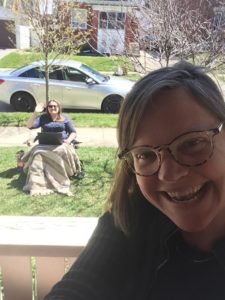
The main focus of our work over the last seven weeks has been determining what our students’ and instructors’ current needs are and how we can meet them. We had begun talking about pandemic contingency plans about two weeks before in-person classes were cancelled. Since our nine fulltime professional tutoring staff [broken link removed] already hold online appointments regularly in WCOnline, we knew it would be relatively easy to shift to a fully online appointment calendar. But we hadn’t really grasped how quickly our other work and programs would change—we weren’t even convinced that they would.
As with many universities, everything ramped up very quickly over a single weekend. Classes at UWaterloo were suspended on a Friday and, by Sunday night, most university operations were shuttered and staff urged to work from home. Classes were suspended for a week so that they could be moved online at the end of that week. Were we ever thankful for that week. We suspended our services and used the week to adapt our drop-in offerings, move our graduate programs online, and launch new online initiatives.
Drop-In Peer Tutoring Online
While we could quickly adapt our appointments with fulltime staff and even our embedded peer tutoring to online systems, our drop-in offerings presented a different challenge. Our current drop-in program is just a year old—Clare and Stephanie developed it over the past year, when Stephanie left her role at the campus teaching centre to join the WCC. Together they took the team from a staff of four co-op undergraduate students who worked fulltime as tutors for just one term to a team of ten part-time undergraduate and graduate peer tutors who stay for multiple terms. We now offer 48 hours of drop-in appointment times per week, at two locations in our main libraries, staffed by our amazing peer tutors.
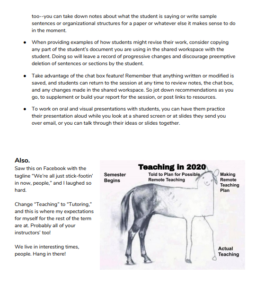
To meet students’ needs during the upheaval of moving to online learning, we had to decide how to best make peer tutors available to students. Recognizing that students were sleeping later and working later, we decided to shift to evening drop-in times, using a separate WCOnline calendar. We worked overtime during the off-week, along with caring for our children, to get a new schedule ready for peer tutors and prepare them for this shift. Our amazing administrative assistant updated our website and promoted the changed drop-in services on social media. Along with a senior peer tutor, Stephanie developed a quick guide for peer tutors about online tutoring, and she held one-to-one orientations with each peer tutor in WCOnline. Then we had two weeks of online evening drop-in sessions before the term ended. We didn’t get a lot of uptake from students in the end, but we were glad to see some of our regular students find us online, and we were grateful that we could keep our peer tutors employed through the end of the term. So, as a result of this shift in programming, we were able to meet needs of both students and peer tutors.
UWaterloo is on a three-term system, so for the coming spring term, which runs from May through August, we’re adapting our evening drop-in system. We have five peer tutors staying on, and we’ll be offering three hours of drop-in appointment times Sunday through Thursday evenings. After some trouble-shooting, we’ve decided to keep these appointments in their own calendar. We’ve blocked off all appointments with placeholders, which the peer tutor on deck will then remove a few minutes before the first appointment time each evening, to keep the sessions as “drop-in-y” as possible. We’ll also be focusing our peer tutor PD for the term on online tutoring. And we’re going to ramp up our social media promotions around the virtual drop-ins to get more traffic. We’ll let you know how it goes!
Online Graduate Programs
Because we already have an online Dissertation Boot Camp offering, we were able to quickly pivot on our in-progress eight-week Boot Camp to offer the last three weeks online. We also shifted our recent intensive four-day camp online. Participants in this camp were especially engaged in and positive about the experience, and we’re thankful that we could support these thesis-writers in this way when they needed it.

We also moved our twice-weekly Grad Writing Cafes online and combined them with our weekly Faculty Writing Cafes to provide three options per week [broken link removed] of guided, focused writing time for graduate students and faculty members. We use the Virtual Classroom in D2L (what y’all call BrightSpace) to guide participants through Pomodoro sessions and encourage them to share their goals and progress with each other. Most participants engage using chat. Interestingly, we’ve seen an increase in private questions to the facilitator, meaning we’re able to provide support to individual writers even more than we would normally in person. It’s been gratifying to see the turnout—which has been consistent with our in-person cafes—and know that we are meeting these writers’ needs.
Next month, we’ll be launching an online version of our Speak Like a Scholar program, which is a bootcamp-style intensive program that prepares doctoral students for their thesis defenses. As with every shift to virtual environments, we’re playing around with options for encouraging peer feedback, motivating participants, and creating community within a combination synchronous and asynchronous formats.
Workshops
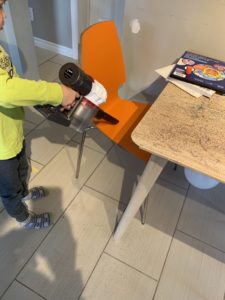
As group activities, workshops are postponed for now, but our team of fulltime staff is working to create online asynchronous workshops in our LMS. We’re starting with our most popular, enrollment-wise, which are: Clarity in Scientific Writing, Integrating Evidence for Graduate Students, our Grammar Studio Series (three sections), our two-part Literature Reviews workshop, and our two-part presentations workshop, which is called Design and Deliver. We’re trying to keep the online modules relatively simple and activity-based, to engage participants and also manage our workload. But we’re grappling with the usual issues that come along with making online content accessible—captioning and descriptive transcripts are time-consuming, and we don’t have systems built in to help us navigate guidelines and deadlines around accessibility. We’re thankful that this current situation is revealing gaps in our knowledge and processes, but we’re still at a loss at times for how to best make our content accessible when we’re short on time and resources.
Along the way, we’ve had requests begin to come in for in-class workshops for the spring term. We’re aiming to meeting those needs as much as possible but are balancing the tricky position all writing centres are in, where we want to remain an indispensable resource while also preventing staff burnout. One solution Clare is contemplating is getting a Roomba to deal with the layer of glitter left on her floor by her baby unicorn. On a more related note, Stephanie created a short video to replace our five-minute in-class WCC intros; we’re encouraging instructors to share the video with their students online. It was a fun project, but of course very time-consuming. Still, Stephanie is glad to have a great answer to the question, “What new skill did you learn during quarantine?” Answer: iMovie.
New Online Initiatives
One key consideration during this time is how to maintain the sense of community that is foundational to our centre and to our university more generally. At the initiative of our peer tutors, we’re posting pandemic-related blog posts, and we’ve launched some brand-new offerings: a subreddit (which we need to promote more!), and two live virtual services (a weekly live Q&A on Instagram, where a peer tutor answers any writing-and-communication-related questions, and a live weekly write-in on YouTube, where a peer tutor leads participants through goal-setting exercises and Pomodoros). We were pleased to see some turnout to the live social media events even in the final weeks of a term that was in upheaval, so we’re hopeful that these will be a way we can continue to meet the needs of students during the online spring term.

We’ve also found that we need to really ramp up our presence on Twitter and Instagram, as social media is the only means we have for communicating our services to students. We’re thankful to have a co-op student working for us who can devote much of her time to this aspect of our work. We’re also still trying to sort out how to support English Language Learners, who would normally come to in-person conversation circles and cafes. More and more, we’re seeing how this dramatic shift to being fully virtual is requiring us to re-examine and reassess our current offerings and look for ways to improve our services permanently.
So all that to say: we’re doing okay.
How about you?
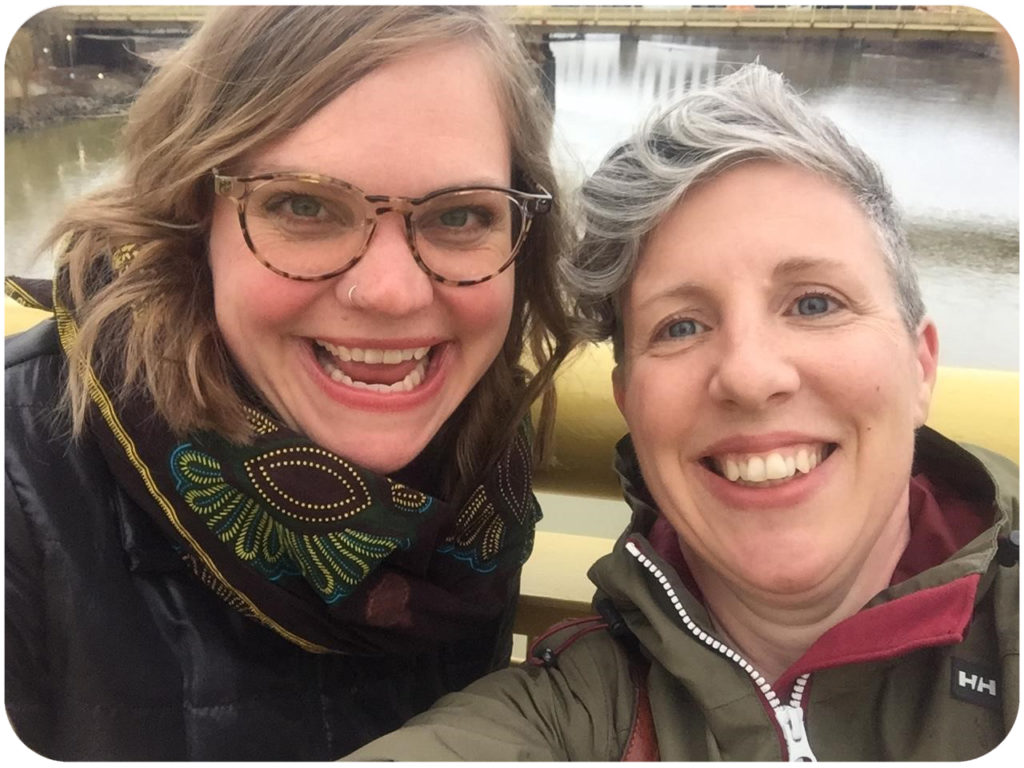
Stephanie White, a former UW-Madison Writing Center tutor and WAC TA Assistant Director and a lifetime member of the Brad T. Hughes fan club, is a Writing and Multimodal Communication Specialist at the University of Waterloo Writing and Communication Centre, where she oversees peer tutor programs. Clare Bermingham is the director of the University of Waterloo Writing and Communication Centre, where her boundless energy and positivity keep everyone afloat.

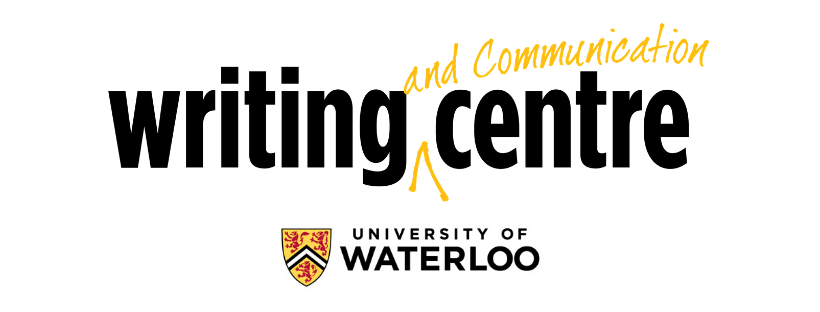
Amazing iMovie, Stephanie!! Also awesome to hear how you’ve adapted the WC offerings – Waterloo is lucky to have you 🙂
DANA!!! Thanks for reading.
That is some quick work to shift so quickly toward addressing new and emerging needs. In my org we’re using the term “pivot” a lot right now: it’s not about changing the mission and vision you’re rooted in but about turning to respond to the current situation. These were some really helpful examples of how to do that: thank you!
Thanks, big sister!
Hi Stephanie, thanks for this article! Really good read in such a difficult time of COVID-19. Thanks once again!